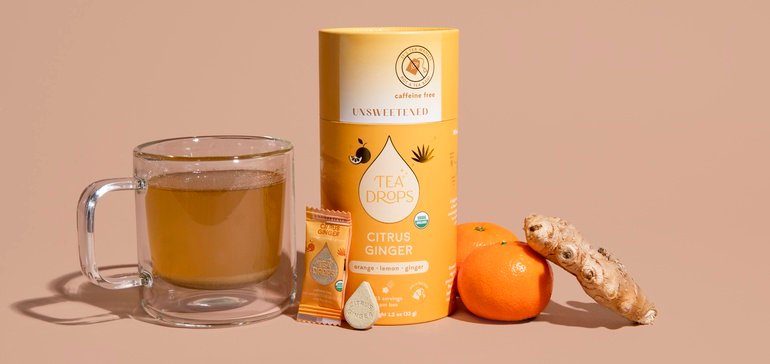Dissolvable beverage startup Tea Drops raises $5M

Dive Brief:
- Dissolvable tea startup Tea Drops has raised a $5 million Series A round led by consumer brand-focused venture capital firm BrandProject, according to a press release emailed to Food Dive. Other investors include Siddhi Capital, AF Ventures, Cue Ball Capital and Halogen Ventures. The round brings Tea Drops’ total funding to $8.4 million.
- Tea Drops will use the new investment to make hires around ecommerce and operations. The company is on track to manufacture 10 million Tea Drops this year and has been named one of the fastest direct-to-consumer (DTC) brands on Shopify after posting 350% year-over-year growth.
- Describing its product as organic “bath bombs for tea,” Tea Drops has a focus on ethical sourcing, transparent ingredients and sustainability, with a format that aims to cut down on packaging waste. These qualities, along with its female leadership, have attracted investors’ interest.
Dive Insight:
Tea Drops is hoping to revolutionize the way the world consumes tea with its bagless dissolvable teas. This is as consumer demand for more sustainable packaging has gained momentum even amid the pandemic. In addition to creating waste, tea bags have also been associated with microplastics. A 2019 study found that steeping tea contained in tea bags at a certain temperature releases around 11.6 billion microplastics into the cup, which is a much higher level compared to other beverages and foods.
Several other brands are marketing plastic-less tea bags, including PG Tips, Twinings, Teapigs and Numi Tea. Teatulia and Pukka offer teas in compostable packaging.
The dissolvable beverage space has also seen activity, with players including Nuun, which offers dissolvable hydration tabs and was recently acquired by Nestlé; Austria-based Waterdrop, which is debuting its hydrating “microdrinks” in the U.S. this year; and Coca-Cola Japan, which has released a line of freeze-dried green tea and coffee cubes.
Another unique aspect about Tea Drops is that it is female-founded and led. CEO Sashee Chandran formed the company in 2015, and today more than 50% of its investors are women. The company also claims to operate a “female-forward” supply chain and employ primarily women.
Female-led startups secured only 2.3% of VC funding in 2020, according to Crunchbase data. This has led some investors to make a stronger effort to seek out female-founded startups to better balance their portfolios. Tea Drops has also caught the attention of female-focused VCs like AF Ventures, which is a women-owned firm.
BrandProject is a fitting partner to help take Tea Drops to the next level. It has backed other successful DTC brands including Freshly, a provider of fresh-prepared meal delivery services that was later acquired by Nestlé; and functional ingredients shake maker Daily Harvest. In a statement about the Tea Drops investment, BrandProject Founder Andrew Black cited his firm’s interest in “highly innovative businesses operating in large addressable markets.”
“Tea is the world’s most consumed beverage, next to water, and yet the overall category has lacked innovation in both experience as well as packaging,” Black said.
Siddhi Capital has also backed a number of DTC and beverage brands such as better-for-you cereal maker Magic Spoon; flavored water maker Hint; and Recess, a provider of CBD-infused sparkling waters.
A July 2020 report by Euromonitor found that tea sales in the U.S. suffered during the pandemic for loose-leaf and bagged varieties, hit by the shutdown of foodservice. It expected sales to drop 13% with ready-to-drink teas down 11%. That said, herbal teas were outperforming the category as consumers looked for functional benefits.

